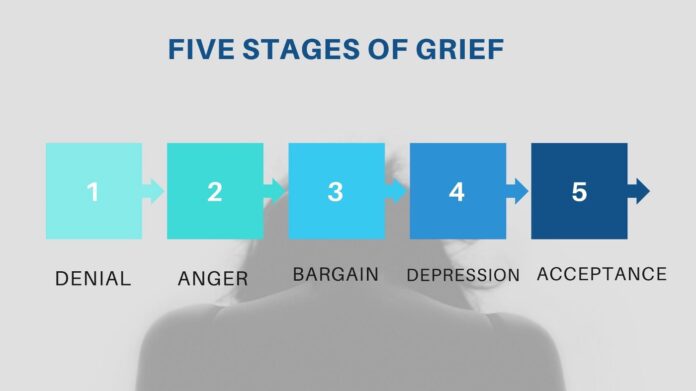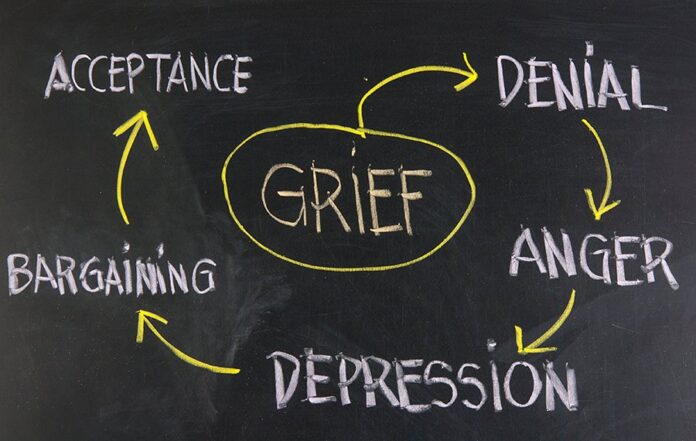Life is undoubtedly challenging. It’s challenging to manage the unique stressors including earning a living, educating your kids, and getting through the day. When a loved one dies it’s incredibly difficult to accept. Death is a surreal experience. One day your loved one is present, and the next moment they’re gone. It takes time and patience to process death. You may feel like you’ll never get through it. But, with time and emotional effort, you will get to the other side of the grieving process. Grief is extremely painful and confusing. It can help to read about it so you can understand more of what you’re experiencing. Check out the section on grief at BetterHelp and gain clarity on what to expect when you’re mourning the loss of a loved one. It helps to understand the various stages of grief. That way you know what to expect during a loss. Here are the five stages of grief and how people experience them.
Who developed the five stages of grief?

The five stages of grief were developed by Swiss-American psychiatrist Elizabeth Kübler-Ross. Kübler-Ross spent a significant portion of her career working with terminally ill patients. As she got to know them, she realized they accepted their diagnosis and the fact that they were dying in stages. Kübler-Ross wrote the book “On Death and Dying,” in 1969, where she identified in “Five Stages of Grief.” They are: denial, anger, bargaining, depression and acceptance. The patients took some time to accept that they were going to die. In addition to helping people cope with a terminally ill diagnosis, the five stages of grief help individuals process grief after someone they love died.
The five stages of grief

Here are the five stages of grief and how they impact us. It’s important to note that sometimes we move in and out of each phase. For example, you may have days where you’re in denial of your loved one’s death, and then you get to a place of anger. Grief can be linear, but doesn’t have to be that way.
Denial – When a loved one dies most people are in denial. During the denial stage, people can’t seem to process that their loved one is gone. It feels like a dream. The brain has trouble understanding the concept of death. It feels like there must be a mistake. This is an illusion or a false reality. It’s understandable that you’re in denial after a loved one dies; it is a painful experience and you’re having difficulty processing it. Sometimes the denial stage moves quickly into the next phase of anger. Other times people remain in denial for quite some time because they are having difficulty accepting that their loved one is gone.
Anger – Once the person accepts their loved one is gone strong emotions start to come up. Sometimes people are sad and other times they move into the anger stage. Typically, anger occurs after denial. You may wonder why your loved one had to die. When someone dies suddenly, it’s painful because you don’t have time to process what’s going on. The reality is death tends to feel sudden even if you know that it’s coming. It’s natural to feel angry after a loved one dies. You resent that they’re gone and wish they could come back. You think things like “why me?” or question the fairness of it. Death feels like an injustice to some. That’s why they feel angry when it happens.

Bargaining – After an individual processes their anger, they’re desperate to get their loved one back. Their mind is convinced they can negotiate to bring the person who died back into the world. It’s not a rational thought. When someone is grieving they may turn to religion to get them through this tough time. They could pray to G-d and bargain with a higher power to get their loved one back from the dead. Unfortunately, there’s no negotiating with death. It has a finality to it.
Depression – When you envision the grieving process you may think of people crying. Most individuals experience sadness or depression after someone dies. When it comes to the five stages of grief, depression occurs when a person feels helpless about the death of their loved one. They withdraw from the world to cope with the sadness. During the depression stage a person feels emptiness. They have to accept a reality where their loved one is no longer present. It is a painful stage of grief. Nobody wants to feel powerless. If depression worsens, it’s critical to be mindful of it. If you experience suicidal ideation, or your depression feels unbearable, it’s crucial to reach out to a mental health professional or go to the emergency room if necessary. One thing to remember is depression doesn’t last forever. After you realize that there’s nothing you can do about the fact that your loved one died, it can be somewhat of a relief. It leads into the final stage of grief, which is acceptance.

Acceptance – The final stage of grief is acceptance. You finally come to terms with the fact that your loved one died. Acceptance can be a freeing state. You don’t have to fight death. Once you accept the person you loved is no longer in your life, you relinquish control to a higher power. it doesn’t mean they’re gone forever; they continue to live on in your memories. Cherish the time you had with that person when they were on the planet. It’s comforting to look at old photo albums, or tell stories about your loved one with your friends and family. But accepting that they’re gone can be a relief once you get there; it’s the final stage of grief.
Talk about grief in therapy
When you’re going through the grieving process it can be helpful to talk to a therapist. You might consider seeing a mental health professional who specializes in grief. Find an individual therapist, or join a grief support group. It can help to talk about the grieving process because you’re not keeping everything inside. You don’t have to grieve alone. Mental health professionals are willing to support you through the five stages of grief.









